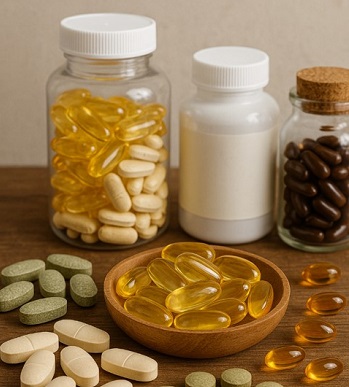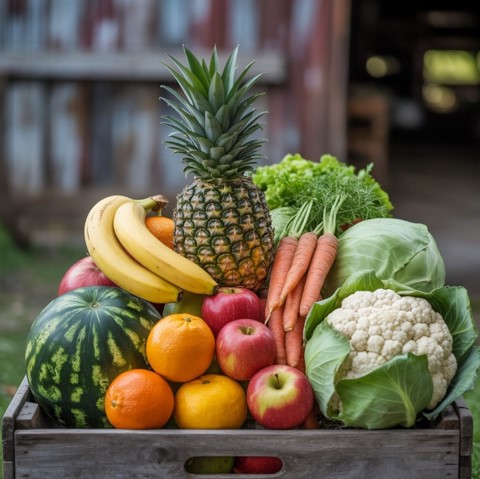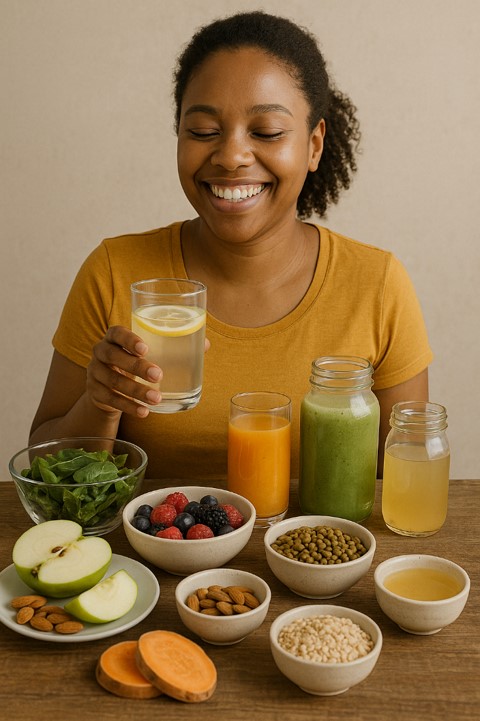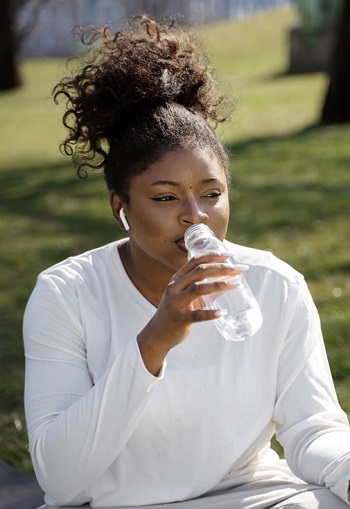7 Best Ways for Africans to Get Glowing Skin Naturally
By: Glory Ngokere, B.Sc. Psychology. Freelance health writer and DLHA Volunteer. Medically reviewed by the DLHA Team.

Portrait of a young black lady posing radiantly with glowing skin. Image credit: Freepik
Glowing skin reflects health, vitality, and youthfulness making one feel more confident in their appearance. In a bid to get glowing skin, many people hop from one product to another damaging their skin in the process. But here’s the truth: glowing skin isn’t about the most priced or hyped product.
In this article, I will share 7 natural and practical ways you can achieve a glowing skin. So, if you’ve tested different skincare products in attempts to achieve glowing skin but aren’t seeing the results you want, if you’re too busy to commit to an intensive skincare routine, or you’re just curious about natural and less stressful ways to get that radiant glow—stick around, this is for you.
Glowing skin isn’t perfect skin with zero blemishes. Perfect skin is a myth — it is normal for glowing or healthy skin to have minimal blemishes from time to time. And let’s be clear, ‘glowing skin’ isn’t limited to a specific skin tone. Whether your skin is yellow, black, or white, or anywhere in between, it can definitely glow.
So what is glowing skin? It’s a healthy-looking skin that exudes radiance, smoothness, suppleness, evenness and a well-nourished complexion.
Now let’s get right into the nitty-gritty of how you can get glowing skin.
Infographics: How to get glowing skin naturally. Click on image to enlarge.
The best way to get glowing skin is from within, not necessarily by using ‘expensive skincare’. Getting glowing skin requires a combination of good nutrition, proper hydration, detoxification, and safe, effective products that penetrate the skin and work from the inside out.
Here are 7 natural and practical ways to achieve glowing skin:

AI-generated image of nutrient-dense foods for a nourished body and healthy skin (From Leonardo.ai).
Eating healthy isn’t as complicated as most people make it seem. It simply means eating a balanced diet daily and cutting down on overly processed foods and refined carbohydrates. You don’t need to break the bank to eat healthy too.
Introduce nutrient-dense foods to your diet as often as you can. Think healthy fats (like avocados, nuts, fatty fish, and dairy foods), lean proteins (like eggs, white-fleshed fish, legumes, chicken, and Greek yogurt), and complex carbohydrates (like sweet potatoes, oats, berries, and leafy dark green vegetables).
These foods are packed with vitamins (like A, C, and E) and minerals (such as zinc and selenium), which are essential for skin repair and protecting your skin cells from UV damage. They also help improve your skin’s firmness and moisture levels. [1]

AI-generated image of dietary supplements for boosting nutrition and achieving healthy, glowing skin (From ChatGpt).
If you eat nutritious food regularly, you may be getting all the nutrients you need. For others, however, access to these highly nutritious foods might be limited, or they might not be getting enough of them for some reason. That’s where dietary supplements come in. Also, your body requires certain nutrients more at different stages of your life and as you age, your body might struggle to break down certain foods making dietary supplements a helpful alternative. [2, 3]
For healthy glowing skin, supplements like collagen, vitamin C, omega-3 fatty acids, biotin, probiotics, and zinc can support skin elasticity, hydration, and radiance. However, it’s always best to consult your healthcare provider before starting any new supplements, especially if you have any health conditions or are pregnant. [4]

AI-generated image of fruits and vegetables for nourishing the body and a glowing skin (From Ideogram).
Fruits and vegetables like berries, leafy greens, carrots, cucumber, mango, papaya, avocado, citrus fruits, and more are loaded with antioxidants that fight free radicals and reduce oxidative stress, resulting in healthy, glowing skin. They contain minerals and phytochemicals that boost overall body and skin health. Moreover, fruits and vegetables are rich in water, providing your skin with beneficial hydration.

AI-generated image of an African woman with fiber-rich foods, probiotics, and detoxifying drinks for a healthy gut. (From ChatGPT)
The gut, also known as the gastrointestinal tract is responsible for digesting food, absorbing nutrients, and filtering wastes. While there is no solid research to fully back this, some claims suggest that poor gut health may contribute to certain skin conditions like acne, eczema, and psoriasis.
Cleansing your gut periodically can help flush out toxins, potentially leading to clearer skin. To cleanse your gut naturally, focus on fiber-rich foods, probiotics, and detoxifying drinks like lemon water, fresh juices, smoothies, apple cider vinegar, and ginger water. These help improve the gut microbiome supporting proper food metabolism and healthy bowel movement. [5]

AI-generated image of an African woman with herbal tea. (From Leonardo.ai)
Herbal teas are well-known for boosting overall health — improving heart health, boosting metabolism, and strengthening the immune system.
They’re also rich in antioxidants that help repair skin cells and protect them from damage. Herbal teas like green tea, chamomile, lavender, hibiscus, and peppermint can reduce inflammation, detoxify the skin, and boost hydration levels. [6]

AI-generated image of healthy snacks for clear and healthy skin. (From Leonardo.ai)
It’s fine to indulge in “processed snacks” every once in a while. Let’s be real, it’s almost impossible not to. But it shouldn't become a habit.
Processed food & snacks add little to no nutritional value to your body. They can even break down your collagen and elastin, leading to dull, lackluster skin. Instead, ditch those processed snacks and replace them with healthier alternatives.
There’s a wide variety of fruits, nuts, and vegetables for you to snack on. I mean, imagine munching on carrots, cucumbers, or healthy nuts, your body and skin will thank you.

Image of an African woman drinking water from a bottle. Image credit: Freepik
Last but not least is hydration. Water has a lot of benefits not just for the body system, but for your skin too. When you’re hydrated from within, it shows on the outside.
Proper hydration helps erase fine lines and wrinkles leaving your skin nice and supple. However, I understand that some people struggle to drink enough water and sometimes weather conditions can make it easy to forget. In such cases, your best bet is to set a hydration reminder.
More so, you can also get your water intake from fruits, vegetables, and healthy alternatives to carbonated drinks, like hibiscus drinks. Experts recommend about 3.7 liters (16 cups) of water for men and 2.7 liters (11 cups) for women. [7]
While eating healthy is essential, there are patterns you may need to adopt, or get rid of, to achieve your dream of a radiant skin.
Why is my skin not glowing?
Several factors can influence your skin’s health and appearance, including external elements like sun exposure, pollution, and skincare products, as well as internal factors like diet, hydration, and stress.
If you have a poor diet, use products that aren’t suitable for your skin, or your skin is frequently exposed to harsh conditions, you’re more likely to end up with dull, patchy, and unhealthy-looking skin.
Can I glow up in 7 days?
The answer is no. You can’t just get your skin to glow up in 7 days. ‘Glow in 7 days’ is just a marketing gimmick.
According to experts, when you make lifestyle changes and start eating healthy and using effective products, it might take between 4-6 weeks to see slight visible differences depending on individual factors.
Can I glow naturally without expensive skincare?
Yes, you can glow naturally without expensive skincare. While skincare plays an important role in revitalizing your skin, your lifestyle is the key factor in determining whether you will achieve healthy-looking skin.
The secret lies in good nutrition, proper hydration, detoxification, and using safe, effective products that meet your skin’s needs.
Glowing skin is less about skincare products and more about what you eat. While mild skincare products (like moisturizers, cleansers, and toners) support skin appearance—the real secret to glowing skin is rooted in nutrient-dense foods, supplements (if needed), detoxification, and hydration.
To get that glowing skin, you have to make a conscious decision to drastically reduce (or cut out) processed foods and consume real, nutritious foods. Also, avoid harsh topical products like the plague—they disrupt your skin’s natural barrier, preventing it from reaching its full glow potential.
1. WebMD. Nutrients for healthy skin [Internet, n.d.]. New York, NY: WebMD; [Cited 2025 Feb 18]. Available from here.
2. National Institutes of Health. Do you need dietary supplements? [Internet]. Bethesda, MD: National Institutes of Health; 2021 December [Cited 2025 Feb 18]. Available from here.
3. InformedHealth.org [Internet]. Cologne, Germany: Institute for Quality and Efficiency in Health Care (IQWiG); 2006-. In brief: What are dietary supplements? [Updated 2024 Jan 23]. Cited 2025 Feb 18. Available from here.
4. Healthline. Do you need supplements for better skin? Here’s what the science says [Internet].2022 August 17. [Cited 2025 Feb 18]. Available from here.
5. Healthline. 8 ways to do a natural colon cleanse at home [Internet]. Updated 2024 Apr 3; [Cited 2025 Feb 18]. Available from here.
6. Healthline. 10 healthy herbal teas you should try [Internet]. Updated 2025 March 5; [Cited 2025 May 18]. Available from here.
7. Dateline Health Africa. 10 Health Benefits of Drinking Water. [Internet]. 2022 Oct. 9. [Cited 2025 May 18] Available from here.
Related: Skin bleaching in Africa: What you should know
Published: May 20, 2025
© 2025. Datelinehealth Africa Inc. All rights reserved.
Permission is given to copy, use, and share content for non-commercial purposes without alteration or modification and subject to source attribution.
DATELINEHEALTH AFRICA INC., is a digital publisher for informational and educational purposes and does not offer personal medical care and advice. If you have a medical problem needing routine or emergency attention, call your doctor or local emergency services immediately, or visit the nearest emergency room or the nearest hospital. You should consult your professional healthcare provider before starting any nutrition, diet, exercise, fitness, medical or wellness program mentioned or referenced in the DatelinehealthAfrica website. Click here for more disclaimer notice.